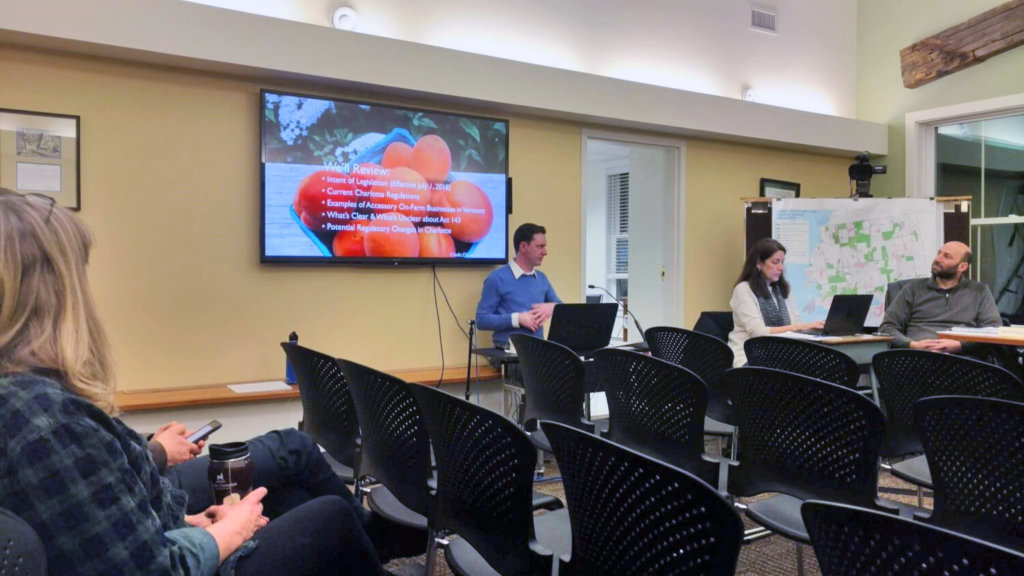Informational session on Act 143 regulating on-farm businesses

Selectboard to seek additional public input in future meeting
The Monday, February 11, Selectboard agenda focused primarily around a review of Act 143, “an act relating to municipal land use regulation of accessory on-farm businesses and to hemp cultivation.” This included an informational presentation from Zoning Administrator Aaron Brown, discussion from the Selectboard, and input from the public.
The presentation to the Selectboard began with an overview of Act 143, excluding the sections on pesticide notification and hemp cultivation. Brown discussed some of his difficulties in interpreting the law, as well as a question of whether the town, which is afforded the opportunity under this act, should take steps to introduce clarifying language to or develop additional land use regulations. Referring specifically to zoning and planning, municipalities can pass additional regulation related to site plan reviews and performance review standards. Currently zoned agricultural land is exempt from these requirements.
As Brown presented he cited a phrase, “sale of qualifying products,” noting that the phrase was confusing and could be interpreted in more than one way. In addition he expressed concerns that he was “not in a place today” to provide input from a zoning standpoint.
Subsequently, Brown met with the Vermont Department of Agriculture and representatives from the towns of Shelburne and Hinesburg to seek clarification on some of the language in the law. The provision is as follows: “The storage, preparation, processing, and sale of qualifying products, provided more than 50 percent of the total annual sales are from qualifying products that are principally produced on the farm at which the business is located.”
Brown was able to gain clarification on what “sale of qualifying products” meant. “The State did not intend that [products] come from other farms; 50 percent of products have to come from the farm on site. Other farms can sell their products, but it doesn’t count towards the 50 percent.”
During public comment, Bud Shriner of Ceres Gardens said, “I sense the intention of the act was to create an alternative means of necessary income.” He asked, “Where do farm stays and events fit into the 50 percent products produced?” Brown responded that it was somewhat unclear, at least to him, whether events have to feature qualifying products. “In my opinion, it doesn’t feature the 50 percent requirement,” he said.
During his subsequent meeting with the Department of Agriculture, Mr. Brown gained some clarification on this topic. “In terms of events, I raised the issue of frequency threshold. There is no limit on the number of events a farm could possibly hold.”
Several members of the Planning Commission, as well as the owners and staff from Philo Ridge Farm, were present at the Selectboard meeting. Chair Lane Morrison asked if those from Philo Ridge felt there were any constraints to the current act language. Grant McCargo, the managing director and CEO of Bio-Logical Capital, which is supporting Philo Ridge Farm, responded for the group, saying, “We are a farm, the market is a way to create value off the product we grow. I am excited the town is looking at this.” He added, “We really continue to operate the way we envisioned before Act 143.” Mr. Brown confirmed Philo Ridge Farm is zoned for agriculture.
Discussion among the Selectboard and members of the Planning Commission continued around performance review standards and the process involved with adjustments to land use regulations. Selectboard member Matt Krasnow said, “This might be cart before the horse, [we should] keep a unified discussion with what other towns are doing and at the state level.” He expressed concern about whether there was a need for additional regulations, saying, “It’s good to have an opportunity for the public to come to another meeting to discuss what is the value and to what degree do we want to see local bylaws changed, and the public feels like they have the opportunity to comment.”
As the agenda item wound to a close, both the Selectboard and Planning Commission members agreed to hold another informational meeting on Act 143 and seek additional public input.
After his meeting with the Department of Agriculture, Brown said, “It seems like a site plan review (and performance reviews) is appropriate for a number of these types of accessory businesses—particularly for traffic, parking, and noise and lighting.” Brown will provide his findings and recommendations to the Selectboard in a future meeting, saying, “I have clearer options to present to them on how to move forward.”

